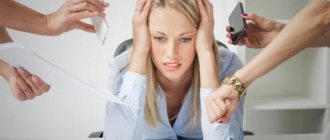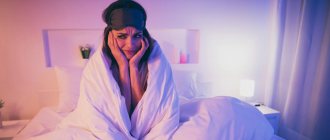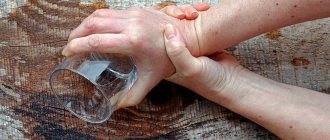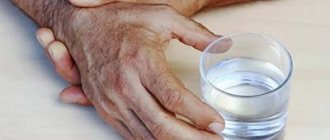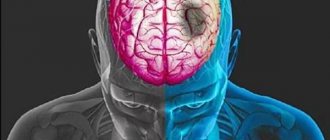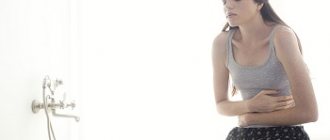Clinical studies demonstrate a link between alcohol dependence and disruption of circadian sleep rhythms. On the one hand, in people with chronic insomnia, pathological cravings for alcohol were noted 2.5 times more often than in people who fully rest for 7-9 hours a day. On the other hand, abuse of ethanol-containing drinks directly affects the production of melatonin, and sleep disturbance after alcohol correlates with the amount drunk.
Physiological aspects of night rest
There are two main phases of sleep - fast and slow, which replace each other throughout the night with an interval of about one and a half hours (normally - 5 cycles). The quality of rest is determined by circadian rhythms and physiological processes. The former are “responsible” for the duration and time of falling asleep, the latter regulate a person’s behavior when tired and the functioning of internal organs during different phases of sleep. Chronic lack of sleep is very dangerous. Adequate rest is necessary to restore and maintain energy balance in brain cells and improve mental activity. Not only insomnia, but also a violation of sleep phases is accompanied by a decrease in immune defense, cardiovascular, emotional and behavioral disorders. Insomnia is one of the risk factors for the development of alcoholism, and even with an existing illness it can cause a relapse.
Don't mix alcohol with sleeping pills
Sometimes insomnia is so exhausting that he is ready to take measures that he would not take in his right mind. He adds sleeping pills to his intoxicating intake. Do not do that! The effects of such a cocktail are dangerous for humans. This hellish mixture is used by people who want to commit suicide. And for good reason. Sleeping pills and alcoholic products enhance each other’s effects and taking them together leads to the following consequences:
- Stomach bleeding;
- Acute headache after waking up;
- Nausea and vomiting;
- General signs of poisoning;
- Coma;
- Fatal outcome.
The scary thing about taking intoxicating drinks together with tranquilizers is that, after falling asleep, you will no longer be able to take measures to save yourself. You will sleep “without hind legs” and will not be able to react to any disturbances in the body. Give up this method of getting rid of insomnia, do not cause irreparable harm to the body.
What happens when you drink alcohol occasionally?
The concentration of ethanol in the blood is not constant throughout the rest period (on average, 7-8 hours). After a noisy feast, a short-lived euphoria occurs, followed by a feeling of fatigue and lethargy. The duration of the stage of falling asleep is significantly reduced, and the first half of night sleep is mainly represented by the deep phase. After a few hours, the concentration of ethanol gradually decreases, its metabolites accumulate, which also cannot but affect the physiology of rest. Deep sleep in the first half of the night gives way to rapid and restless sleep. As a result, a person gets out of bed “broken” and tired; after waking up, he constantly tries to cheer himself up with coffee and energy drinks, which also makes it difficult to fall asleep in the evening. But it takes several days to restore a full sleep pattern. In 10-15% of cases, another portion of alcohol is taken as a sleeping pill. At first, the use of ethanol-containing drinks is episodic, but there is a high probability of developing a stable addiction, especially against the background of a psychological or genetic predisposition.
Medications
The modern pharmacological industry has stepped far forward. Today there are medications that can relieve unpleasant conditions and disorders, including those associated with alcohol withdrawal, in an extremely short time. The only condition put forward by most manufacturers is that they must be prescribed by a qualified doctor. Only a doctor can correctly collect anamnesis, identify the presence of contraindications, intolerances, select the optimal form, and correctly calculate the dosage and duration of use. When it comes to drugs taken orally, doctors most often prescribe the following:
- Painkillers. Mexidol, Zorex and regular aspirin. They have a pronounced analgesic and anti-inflammatory effect, due to which they alleviate the patient’s condition and improve his well-being as part of complex drug therapy. It is better to avoid pure paracetamol and citramon; these drugs in tandem with ethanol have an extremely negative effect on the liver.
- Sleeping pills. The most effective are Elenium, Valium, Diphenhydramine. The drugs have a mild anti-obsessive and pronounced sedative effect. In combination with paracetamol they have a powerful hypnotic effect, but the justification of such a combination should only be determined by a doctor. And it is not always possible to purchase these medications without a prescription.
- Sedatives. Binge alcoholics often do not get sleep due to severe overexcitation or psycho-emotional exhaustion. In this case, you cannot do without sedatives (relieving excessive tension). Afobazole, novopassit, glycine are some of the most popular and widespread. This is due to their effectiveness and lack of addictive effect.
It is strictly not recommended to use these drugs without first consulting a specialized specialist. If it is not possible to call a narcologist at home, and you don’t want to go to the dispensary yourself, as a last resort, you can consult with the emergency dispatcher, but in this case, no one will guarantee safety (the absence of side effects).
Alcoholism disorders
Insomnia and pathological craving for alcohol are closely related. Insomnia is noted in 90% of patients during periods of long-term alcohol abuse. Sleep disturbances after binge drinking persist for several weeks after detoxification (provided they give up alcohol); in some patients, these disorders continue for 1-2 years.
The person is concerned about:
difficulty falling asleep;- shallow sleep with frequent awakenings;
- constant feeling of tiredness during the day;
- sleep apnea;
- realistic nightmares;
- unconscious, convulsive movements of the arms and legs.
In addition, the structure of night rest itself changes.
For persistent alcohol dependence:
- the duration of the falling asleep phase increases;
- in general, the duration of rest decreases;
- the order of the cycles of rapid and slow sleep is disrupted.
In case of acute withdrawal syndrome, the patient may, unnoticed by himself, “fall into a shallow sleep” during the period of wakefulness. This is usually accompanied by auditory and visual hallucinations followed by psychosis (delirium). But in most patients, after proper therapy and abstinence from alcohol, the quality of sleep is completely restored.
Folk remedies
Despite the fact that traditional medicine does not recognize the effectiveness of traditional methods, some of them can have a positive effect (usually short-term), provided they are used correctly. Here are the most effective means:
- Detoxification. First of all, you need to rinse your stomach. To do this, drink a weak solution of potassium permanganate with a volume of at least a liter. Another way is shank prakshalana (cleansing the entire gastrointestinal tract by drinking large amounts of salted water and special yoga exercises). In some cases, an enema or taking a mild laxative (senna tea) is justified. Activated carbon helps well, taken at the rate of 1 tablet per 10 kilograms of body weight.
- Taking diuretics. The most effective natural diuretics: green tea, dandelion, rose hips, hawthorn, hibiscus, cranberry decoction. By drinking them in large quantities, you can cleanse the body quite quickly. But it should be understood that useful salts and microelements will be washed away along with toxins and wastes. Against this background, after such a cleansing, it is advisable to drink a multivitamin preparation.
- Cold and hot shower. Activates blood and lymph flow, promotes the removal of toxins from the body through pores, which begin to work actively, alternately narrowing and expanding. A pleasant bonus from such a procedure is an increase in the adaptogenic functions of the body and tone, and improved well-being. An important rule: always finish with cold water.
- Natural sleeping pills, sedatives and antidepressants. Pharmacies today sell medicinal plant infusions that can be conveniently brewed as tea. They include valerian root, motherwort, hawthorn, hops, mint or lemon balm, St. John's wort, oregano, linden, fireweed, adonis and a number of other plants that have proven their effectiveness. If you follow the recommendations on the packaging, they are absolutely harmless. There are also water and alcohol tinctures on sale that can be taken simply with water (compliance with the dosage is no less important).
- TV. Scientists have proven that white noise has a positive effect on the speed of onset and depth of sleep. It can be created by simply turning on the TV and turning its volume down to minimum. It is important that the lights in the room are turned off and the person is in a comfortable lying position. Preference should be given to neutral programs, without a dynamic plot and active musical accompaniment. The presence of special effects will also negatively affect the effectiveness of this method.
Therapy for insomnia in alcohol addiction
Treatment of insomnia in alcoholism is a complex process that includes medication and psychotherapy, correction of the daily routine, and herbal medicine.
First of all, the very cause of insomnia – the pathological addiction to alcohol – should be eliminated. For this:
All ethanol metabolites are completely removed from the body. In severe cases (for example, prolonged heavy drinking), detoxification therapy is carried out in a hospital setting under 24-hour medical supervision.- Normalize the functioning of the central nervous system. As a rule, B vitamins and psychotropic drugs are used for this purpose (during the period of acute abstinence).
- Restores the functions of internal organs. Hepatoprotectors, cardioprotective medications, enzymes, antioxidants, nootropics, etc. are used.
- They begin a course of psychotherapy.
- They code for addiction using medications, physiotherapy, and proprietary hypnosis techniques.
- They offer a rehabilitation course to consolidate the achieved effect.
Treatment for insomnia begins after detoxification. The fact is that when stopping a drunken state and to alleviate withdrawal symptoms, the patient is usually administered potent psychotropic drugs from the group of barbiturates or benzodiazepines. Such drugs are not suitable for long-term use due to the risk of developing dependence. Therefore, “softer” medications are selected (taken for 2-3 weeks), then the patient is transferred to products containing medicinal plants (valerian, lemon balm, etc.). When circadian rhythms change (wakefulness at night and sleepiness during the day), melatonin-based medications are recommended.
Non-drug correction methods play an important role. Advise:
go to bed and wake up at the same time;- give up daytime rest;
- limit the consumption of caffeine-containing drinks (no more than one cup after waking up), completely avoid energy drinks;
- moderate physical activity 3-4 hours before the planned fall asleep (walk in the fresh air, light jogging)
- water procedures (warm bath, shower, but not contrast);
- in the evening (especially while lying in bed) stop reading or watching videos from the screens of a smartphone, tablet, or computer games;
- have dinner no later than 18.00-19.00.
The combination of drug therapy and correction of the daily routine helps in 9 out of 10 cases.
But the main condition for normalizing sleep is giving up alcohol. Need some advice?
OR CALL A DOCTOR
CALL!
+7
How to restore sleep after binge drinking
Most alcohol addicts and their loved ones often ask similar questions, since sooner or later this problem arises in everyone who is addicted to alcohol. The best solution is to turn to professionals. The treatment strategy in each case will be developed individually. Complex therapy is usually carried out, which includes:
- Detoxification. Toxins, poisons, ethanol breakdown products and free radicals must be bound and eliminated from the body.
- Drug therapy (infusions are the most common). Using IVs for binge drinking. The patient is administered intravenously vitamins, diuretics, sedatives, sedatives, painkillers, antiemetics, angio-, cardio- and hepatoprotective agents. The composition of the pharmacological regimen is determined individually.
- Psychological support. The work of a professional psychologist is aimed at relieving anxiety, instilling confidence in a favorable outcome of the manipulations, and motivating the patient to recover.
The patient feels positive results after adequate actions of a professional narcologist almost immediately upon completion of the manipulations: his general condition improves, his mood improves, he has an appetite and a desire to sleep. For complete cleansing, consolidation of the effect and the appearance of a stable feeling of aversion to alcohol in an alcohol addict, several procedures (on average three to four) may be needed. After such a course, 90-95% of alcohol addicts' sleep is completely normalized.
